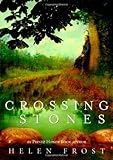|
Farrar, Straus and Giroux: NY, 2009. Printz Honor Author Muriel is an outspoken young woman grappling with the difficulties of life in rural 1917. Up until then, she has had her siblings and two best friends (a neighboring pair of siblings) for emotional support. After graduating, her friend Frank goes to Europe to fight in WWI, and her younger brother is considering following. Muriel's family is split on how it views the war, though it does not drive them apart. Her aunt goes to Washington, D.C. to picket for the Vote for women, and the third big topic of the book is the influenza epidemic. More central, but also more often portrayed, is Muriel's transition to adult responsibility and how she handles it. The burden of the household chores is thrust upon her when her mother takes a job in town. It takes an unusual and necessary experience, one her mother does not want, to propel her out of that role. The story is told in flowing verse, short journal-like entries from three perspectives: Muriel, her brother Ollie, and her friend Emma's. The atmosphere is tense and fraught with emotion from beginning to end. The handling of the topic is good. Not too preachy, just characters' feelings and thoughts on how they are dealing with the issues themselves. The characters are all presented as loving people trying to figure things out, doing what they think they need to do. There is quite a bit of history packed into this little book. This is one of the best war related novels I have read. Maybe because it is all reactions to the war. Maybe because it is not the standard dialogue. It is deeply private reactions. It doesn't hurt that I agree with the lead character's view, but it is also not one-sided. Also, I must say that this is the first place I have read/heard that the spread of the influenza of 1917 was a result of the war, instead of a big scary disease that is bound to be an epidemic. Afterward, my husband said that the U.S. outbreak started in a military hospital. In other words, it was brought over from Europe by numerous soldiers weakened by war conditions. Our citizens had not had previous exposure and were also living with war restrictions, enabling it to spread and injure people more readily. Add to that the fact that sanitation had not reached the whole of our country yet. I really dislike the use of the 1917 epidemic in stirring up fear regarding the flu, and I appreciate that this author is not using it for that purpose.
|
|
Featured Posts
Recent NTugo Network Posts |
©2006-2016 BookAdvice.net. Advice, banner, and coding help given by Redwall_hp. Established May 2006.












